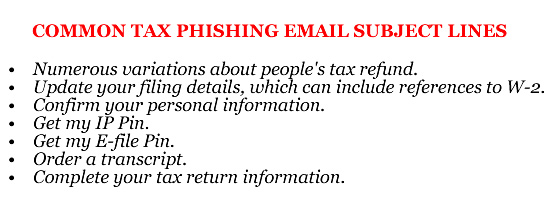Nothing is certain in life apart from death and taxes, apart from tax season phishing scams which have started particularly early this year. Inboxes are already being flooded with phishing emails as cybercriminals attempt to file tax returns early. Not their own tax returns of course, but fraudulent claims on behalf of any email recipient who divulges their Social Security number and personal data to the scammers.
Tax season phishing emails are sent out in the millions in the run up to the April 15, deadline. If a tax refund can be submitted before the victim, the criminals will receive the refund check.
How to Spot Tax Season Phishing Scams
Each year tax fraudsters develop new and ever more convincing phishing scams to get taxpayers to divulge their personal data and Social Security numbers. With these data, fraudsters can submit fake tax returns in the names of the victims.
While phishing emails can be easy to spot in some cases, the fraudsters are now getting much better at crafting official looking emails that appear to have been set from the IRS.
The emails use the same language that one would expect the IRS to use and the email templates use official logos. The emails contain links that have been masked to make the email recipient think they are being taken to an official website. Clicking on the link will fire up a browser window and the soon-to-be-victim will be taken to a website that looks official.
Visitors will be asked to update their personal information, add their Social Security number, or even be requested to divulge their Self-Select PIN for the online tax portal. Divulging these data is almost certain to result in tax fraud.

Tax Season Phishing Emails Are A Growing Concern
Taxpayers have been warned to be ultra-cautious. More tax season phishing scams have been identified this year than in previous years, with tax-related phishing and malware scams up 400% year on year.
IRS Commissioner John Koskinen warned that “Criminals are constantly looking for new ways to trick you out of your personal financial information so be extremely cautious about opening strange emails.”
Tax season phishing scams are not only conducted via email. In fact, phone scams have previously been one of the commonest ways that criminals obtain the information they need to submit fraudulent tax returns; however, the use of phishing emails is growing.
For the 2014 tax year, the IRS received 1,361 reports of phishing and malware schemes in the run up to the April deadline. That total has already been surpassed and February is not yet over. 1,389 reports have already been received. The January total was 254 higher than for the 2014 tax year, with 363 incidents reported by February 16, which is 162 more than the total for the entire month of February last year.
IRS Tax Season Phishing Emails Used to Deliver Malware
While criminals are attempting to phish for personal data, that is not the only consequence of clicking on a malicious link. The websites used by the cybercriminals behind these phishing scams are loaded with malware. Those malware enable cybercriminals to log keystrokes on infected computers and gain access to far more data than Social Security numbers. Bank account logins and passwords can be obtained, access to email accounts, and much more.
Tax Professionals Are Being Targeted with Phishing Scams
It is not only the public that must be vigilant and on the lookout for tax season phishing scams. Tax professionals are also being targeted by cybercriminals using similar schemes. The aim is to get accountants and tax advisers to reveal their online credentials such as their IRS Tax Professional PTIN System logins.
The IRS advice is to be vigilant and report any suspected phishing email. The IRS does not typically request data via email and does not initiate contact with taxpayers via email, text message, or social media channels. If an email is received asking for a link to be clicked or an attachment to be opened, it is likely to be a scam and should be reported to the IRS.
